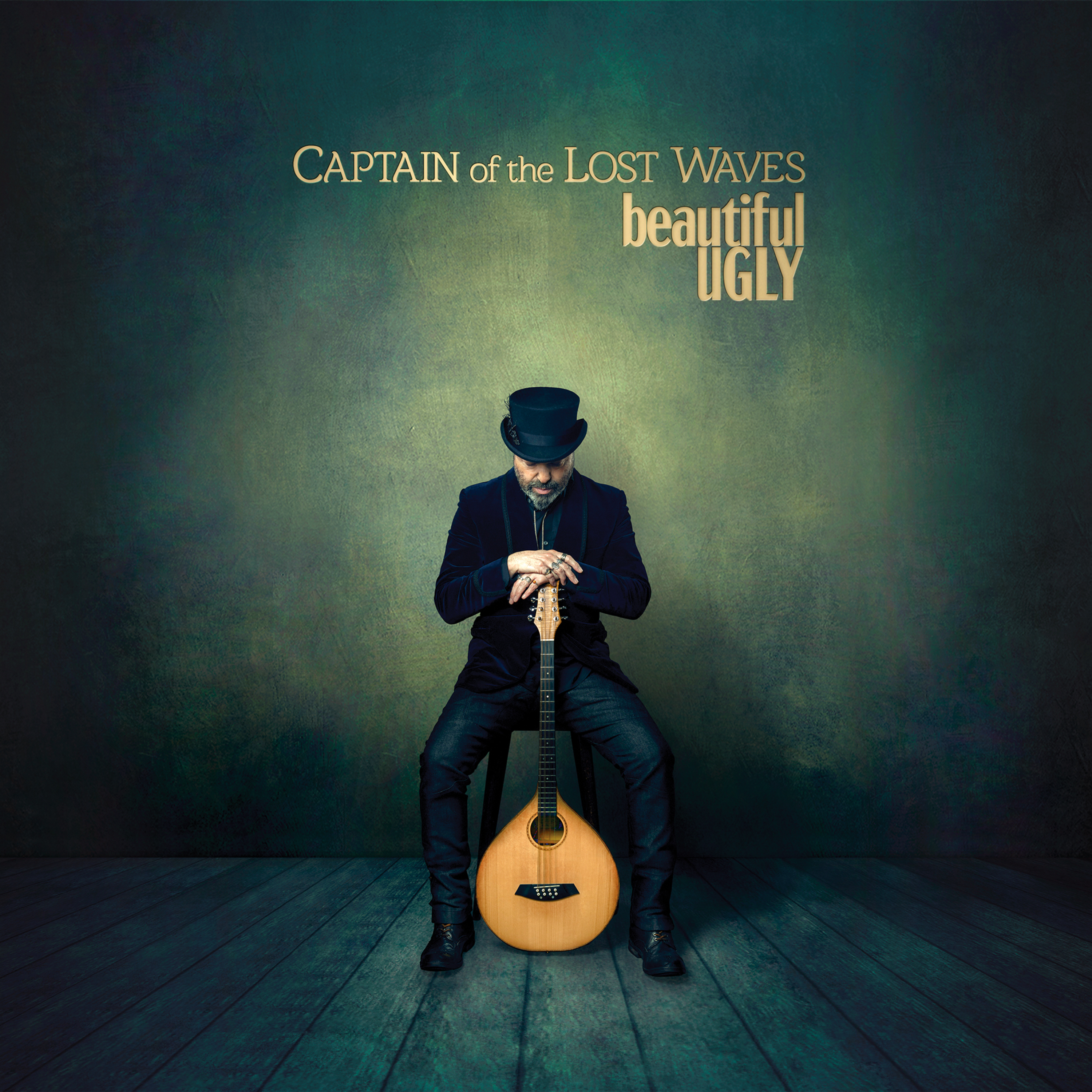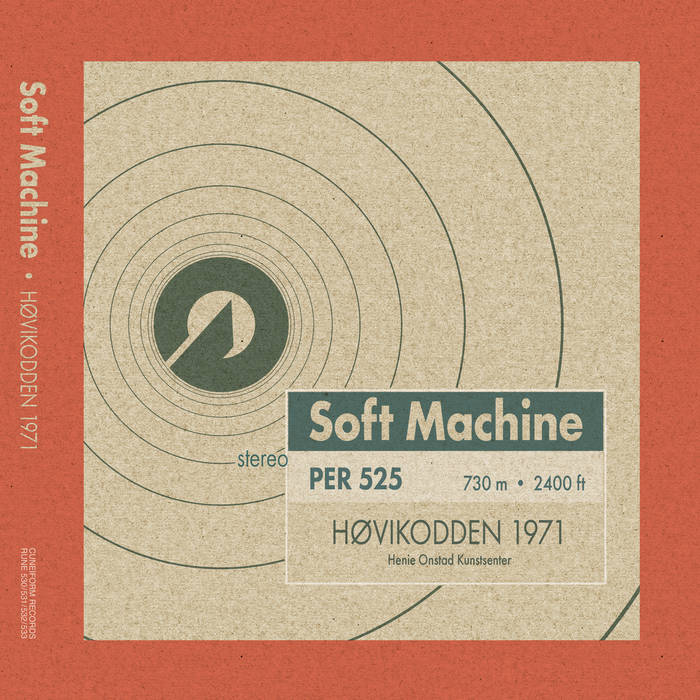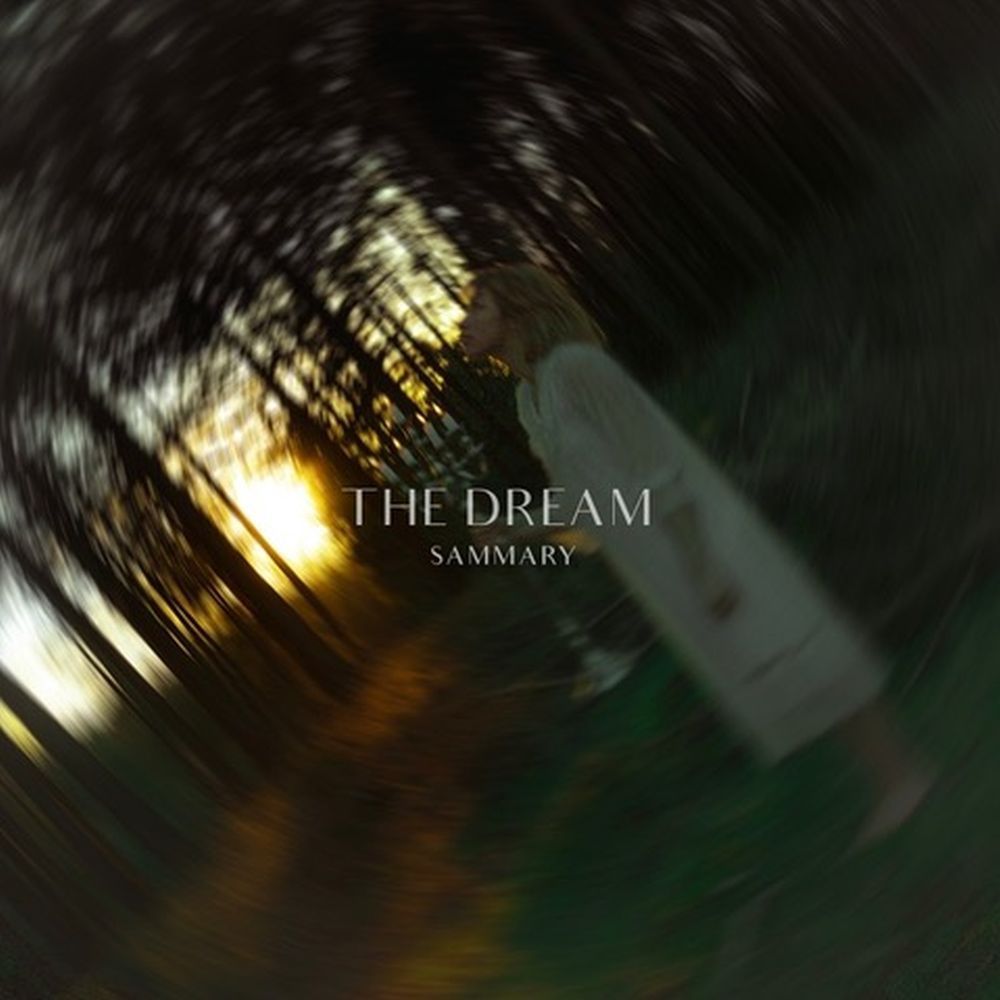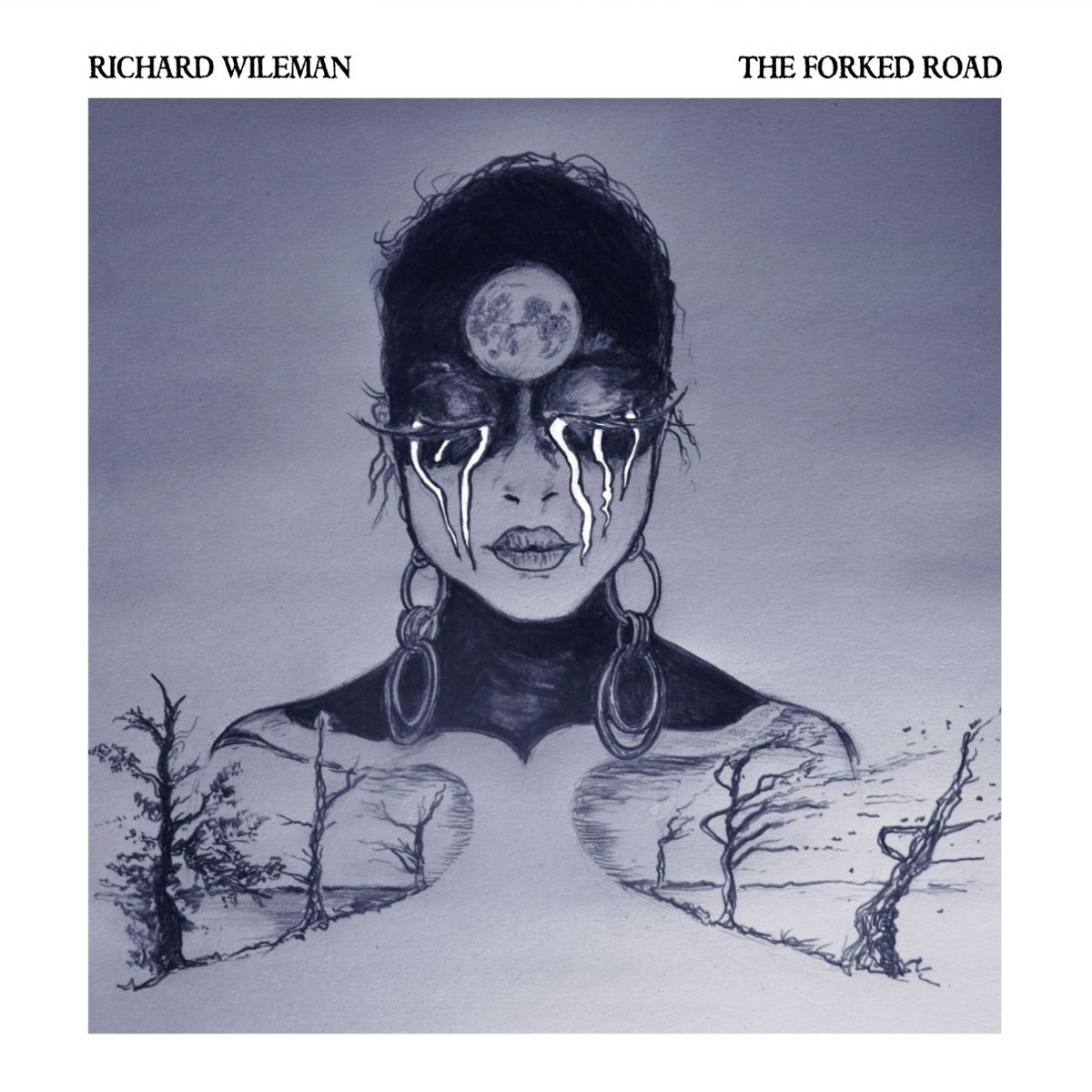Kev Rowland takes us on a Journey with Captain of the Lost Waves
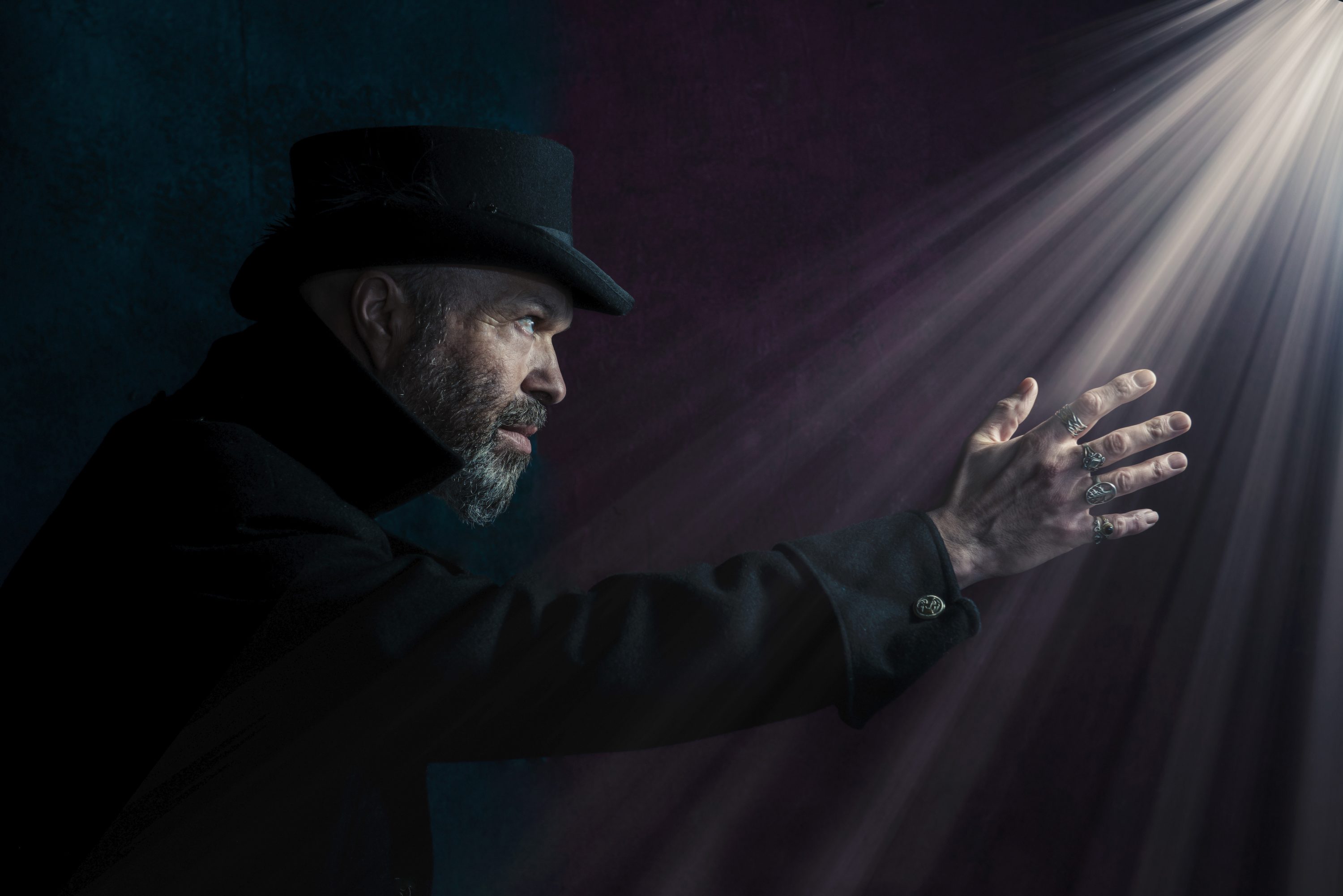
From the very first time I heard his debut back in 2016 I have been fully enamoured by the music of Captain of the Lost Waves, who in many ways is both encapsulating the style of the travelling troubadour and taking music in quite different directions to the norm. Ahead of the release of his next album, the incredible ‘Beautiful Ugly’, it seemed right to sit down and spend time getting to know the artist more deeply, and the result is a wonderfully in-depth and fascinating discourse.
Who, what, when is Captain Of The Lost Waves, and where did the name come from?
In a nutshell, it’s a name, theme and an ethos for the life I wanted to re-negotiate with and to pursue after a serious illness: being bed bound and attempting to arise from the challenges of Glandular Fever.
My affinity for the ‘lost waves’ was a nod to all the many sacred and fascinating elements of life, that we tend to not align with, ignore, overlook or abandon. I thought of the Captain being the instigator of bringing those often forgotten, lost facets of a more natural and mystical way of living and astute observance/fragments of wisdom into the sterility of this, the post-modern world, bringing these almost ancient and indigenous leanings into existence and face to face with my potential audience.
Plus, I was finally adopting and adhering in doing all the things that I was sternly advised against, when I was a part of the corridors of the universe of the so called ‘music industry’: just a short duration in that particular world left me in no doubt that my continued existence as an artist wasn’t going to happen within the realms of such control and commandeering.
What are your earliest musical memories, and who/what inspired you to start playing music?
My earliest memories are of my uncle’s record collection. My first love affair of the sonic variety was with Cat Stevens ‘Tea for the Tillerman’ – I still shiver at the essence of that record and the baritone voice still feels like the hug from the dearest and most treasured of old friends.
It wasn’t long before other forms of music engaged my more primal spirit too: the ‘post punk’ somewhat, strident offerings from bands like Killing Joke, The Cure, Theatre Of Hate made me want to dance, beat my chest, howl and embrace these untethered rituals of wild musical shamanism. (I’ve always connected music to the soul… it always feels otherworldly at its best).
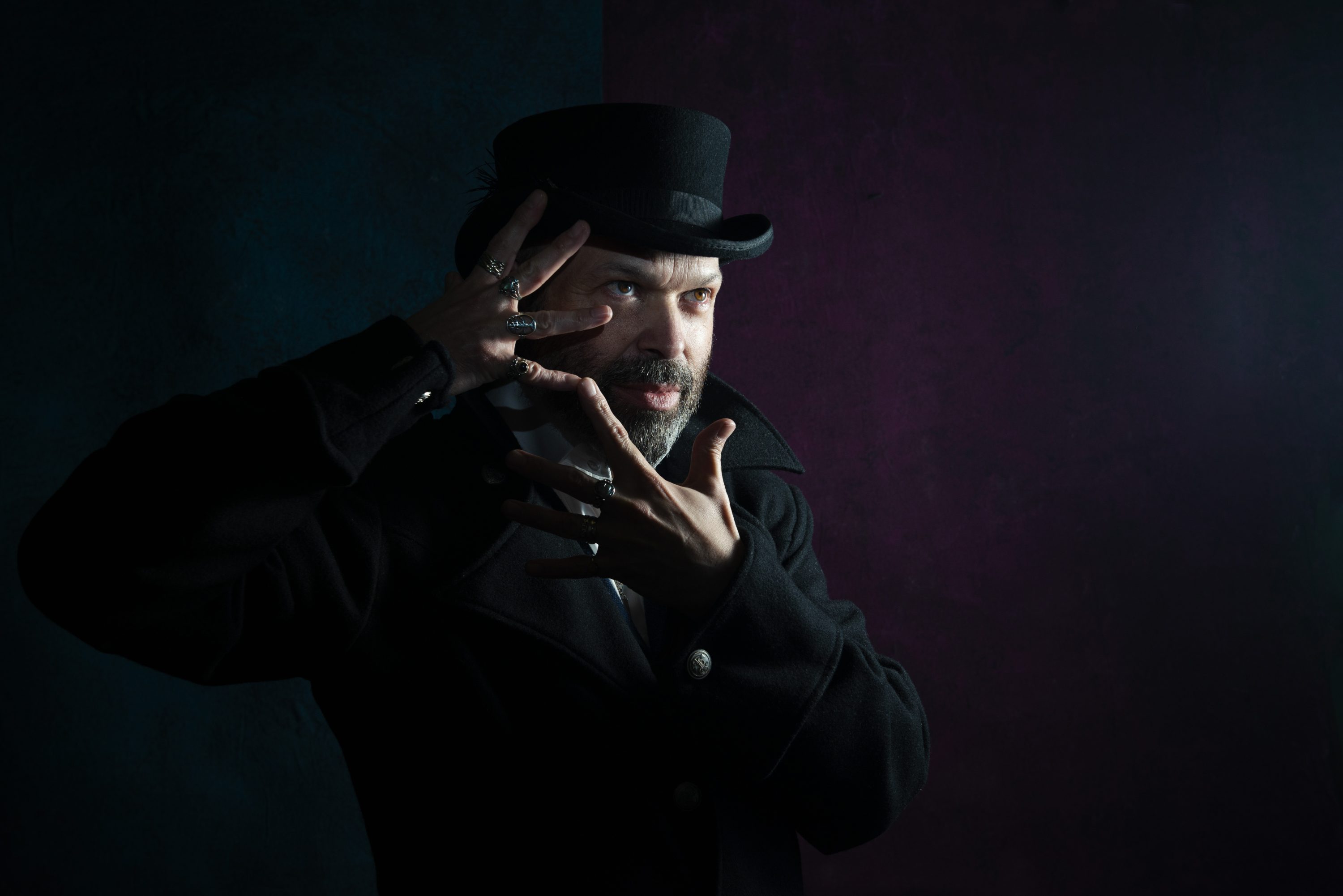
What are you attempting to portray with your name and image, and why did you approach it in that manner?
There was a definitive attempt to marry the profound, contemplative aspects of music with the poetic, bard type offerings where wordsmithery and a slither or two of pure English eccentricity could excel in varying measures of undulation, texture and expression. I’m deeply, deeply eclectic: I created something that I wanted to see and hear; I couldn’t quite find that elsewhere. How could I morph through what I wanted to convert, knowing that it felt as instinctive as that. I wanted to create a mixture of ‘real theatre’ for the everyday man and woman. Where the transparency and ability to be oneself is the core principle.
Full of spirit, devoid of businesslike stylised approaches or otherwise. I have no fixed genre; I am a fluid flurry or interplay with all musical notions; you might choose to call me a storyteller/troubadour as a basic concept, if I had to describe what it is that I do and as to a genre I come closest to, it’s likely the spirit of punk. To have no need to be accepted or follow others, but be thankful you take your own lead, wherever possible.
You first came to recognition with Shaun T Hunter and Quiet Rebellion, what were you trying to achieve here musically, and how did this lead to the formation of COTLW?
I never set out with any defined plan, part of my make up is abandoning to the spontaneous creativity, hence never becoming prescribed or defined by some notion or idea, no matter how well thought out or informed it might be. I feel potentially driven by a core of the themes that fly around and gravitate towards me… it is there that I anchor a little seed or two and let nature work her way as to where it might choose to guide me.
Musically it began with ‘Shaun T Hunter’ and encapsulated differing shifts from puresongwriter acoustic led skeletal offerings, segueing through an alt country sabbaticaland on to a more dreamy, prog production around that songwriter model. Quiet Rebellion was born out of feeling restricted within that chapter, wanting to sonically alter and morph into new directions; it is as if singer songwriters are deemed a particular brand of expression, aligned with adhering to the traditional values of yesteryears writers: so, when one strays into other territories, it can be labelled as sacrilege by curators and gatekeepers. And yet, when I look back at the golden age of imaginative music making these ‘singer songwriters’ were a different breed.
Some of my most inspired and influential offerings in the formative years of my musical journey were informed by such luminaries as Brian Wilson, Cat Stevens, Bowie, Tom Waits, Johnny Cash, John Lennon, Jaques Brel and Leonard Cohen to name a few for starters who were true heavyweights in the public conscience. They were ‘singer songwriters’, though not in the terms that apply in this postmodern arena. Our need to define music is often why we end up repeating these formulas as acceptable and follow a code. I sense making art is not and has never been about a self-serving compliance. The song is always king to me… no matter how we dress it up or accessorise. That’s the core of anything I create and attempt to do.

Why did you feel the need for the change in direction and name?
After a seriously debilitating life episode with glandular fever, I concluded that if I was
ever graced by good fortune to return to the stage, and making music again, I would be governed by the itch of the untethered life force and it’s singular calling… and not by anyone who deemed it as a commercial exercise. In conclusion, I followed my heart entirely, realising that the Captain would be a myriad of all the aspects of myself, of which I was warned, would lead to people just thinking me insane. I laughed at that particular response and thought ‘each of us must embrace fully and see our own madness’ – maybe I was feeling that it was time to execute my vision, rather than be guided by the cold, calculating nature of music business talk. Yes, it was eclectic by design, but that’s exactly what I am, successful or not, I was in tandem with my calling. I have honoured it and respected it with a deep reverence. It can be both liberating and terrifying in a concurrent fashion, but that freedom is as if you’ve dropped out of the so-called race in its entirety.
When you stop caring about what others think you should be doing and just follow your own instinctive nudges and call to action, then you have arrived somewhere that is not prone to being imprisoned by someone else’s advice, dogma, rules or conservative suggestions.
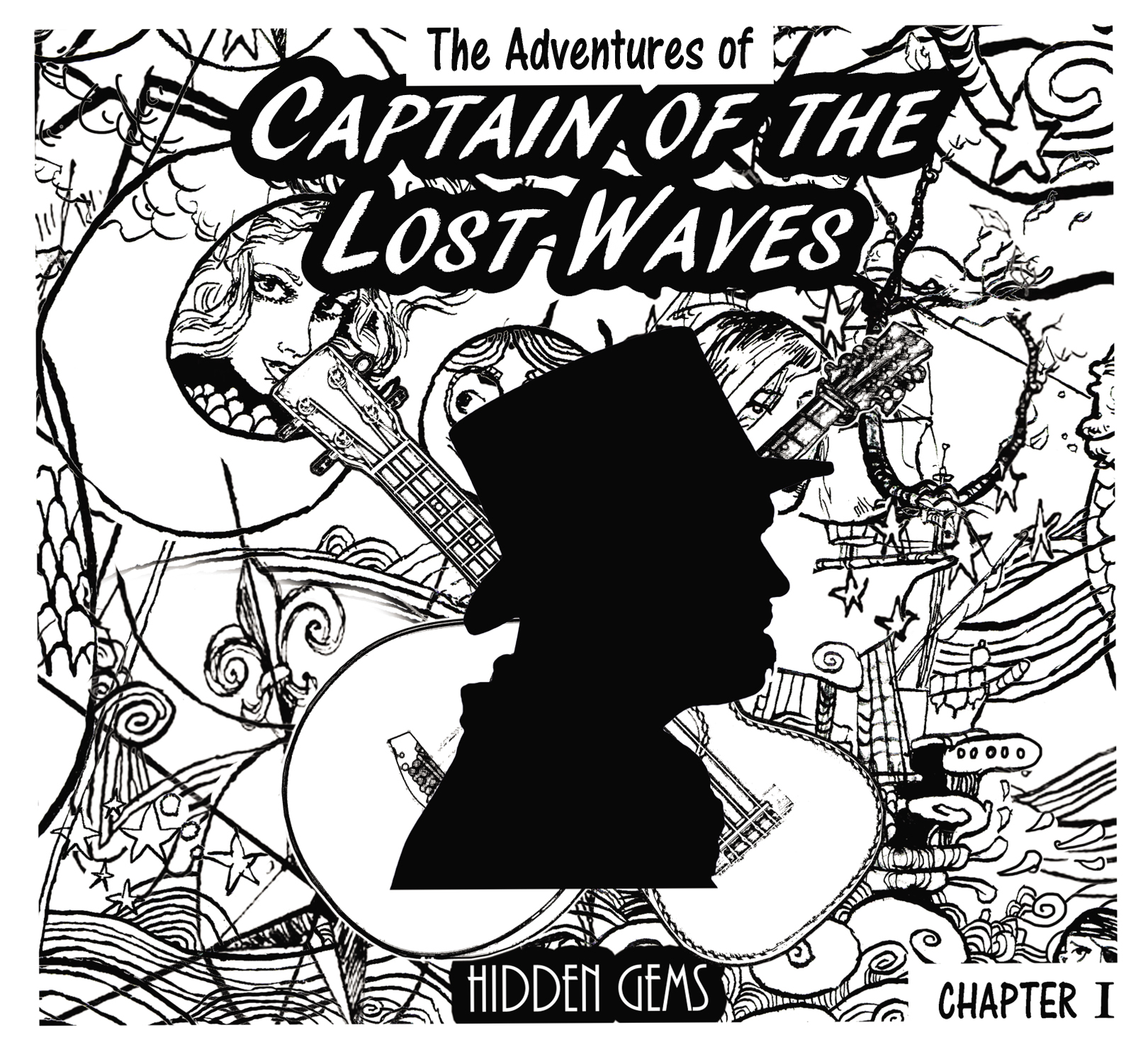
‘Hidden Gems Chapter 1’ is vibrant and exciting, something I described as “music that has been carefully crafted from the finest wood, polished, and honed to perfection, as opposed to yet another piece of throwaway plastic that will only last a few minutes before the bright colours fade: yet another disposable commodity.” How would you describe that album to people who have yet to come across it, and what were the changes which led to the Captain coming fully formed some seven years after ‘Still Talking Scribble’?
I loved that summary of yours and it warms the heart, knowing when someone just radiates with what you have put forth into the world as an artist. I’d describe the album as my first clear foray into this semi-imaginary Captain world, full of wonderful possibilities and replete with profound reflection, embodying music made from and for the heart, yet also emblazoned with touches of an underground fringe showman, revelling in tales of dark eccentricity and laced with a healthy dose of bombastic abandon, humour and searching, philosophical ponderings.
The music itself is deeply melodic, raw, acoustic, with the huge accompanying sounds of the accordion and mandolins, double bass and percussion caressing the core voice, and interchanging between bouzouki and ukulele.
It’s almost tongue in cheek in moments with an Eastern European cabaret sensibility on tracks such as ‘Danger’ and ‘ Fat Freddie’s Fingers’ on some tracks and more Celtic folk, alt folk rock with a touch of klezmer on others. It houses a universal theme… there are moments which sound like drunken Bavarian sailors singing along to choruses, designed to smile and lift.
One of the key things I noticed after my return to music after my serious illness, was that I wanted to have fun in equal measure: maybe as a result of the heavy, challenging times I found myself immersed in. It proved to be the reason I started playing the ukelele and defined that as making something memorable but with feelgood, where possible. Unfortunately, such an instrument carries a lot of baggage and cliches with it. Watching a man in a top hat carrying this ‘toy instrument’ is liable to inform the casual viewer that I must be a novelty act? That was part of the prejudice that I knew I’d face, yet as stated before, let’s approach it with courage and vigour, and not worry about dispelling these long-held beliefs that people hold. I have enjoyed the evolution with the Captain and the natural selection comes from a higher source, I believe. The Uke hasn’t featured on the last album ‘Mysterium Tremendum’ or the forthcoming record ‘Beautiful Ugly’: the sonic soundscape demanded something else. Something more brooding, heavier and darker in places.
But it may return from time to time, variety is the spice of life we were told. I still go by the old adage.
Over time you have explored different musical partners, what has led to this voyage as opposed to staying with the same people and format each time?
I try my utmost to resist repeating myself. Of course, that, in itself, is an impossible dream, when primarily playing a series of core stringed instruments accompanied by a human voice: though how you dare to compose, arrange structures and push in ways that feel both utterly natural and yet experimental is what, I trust, transpires in the evolving visions.
I work with people who embody the unrelenting spirit of those components; I have never had the intention of consciously changing line ups. It only happens when something stops serving the whole. I am not prescribed in any way; often what might have served me extremely well might dissolve, due to a fresh approach that becomes ever more inspiring. If that is clearly evidenced, it’s then watching how the current line-up responds to that dichotomy. If it’s meant to progress, it shall do so. In complete honesty I’ve not yet witnessed someone leaving due to musical differences; it’s been more about life circumstances and their priorities that have led to such dissolution.
It’s a mixed bag; the trust in working with a long-time partner/line-up can reap huge dividends. I have had that with my long-time friend Damian Clark, who has done everything in a truly collaborative sense: from original design work with the Captain logo and website, to his wonderful musical ability on synths, keyboards and musique across the breadth of my releases. He has been a massive help in his commitment and his support and invaluable advice in the many personal life matters I have navigated might be the greatest gift of all that he has bestowed.
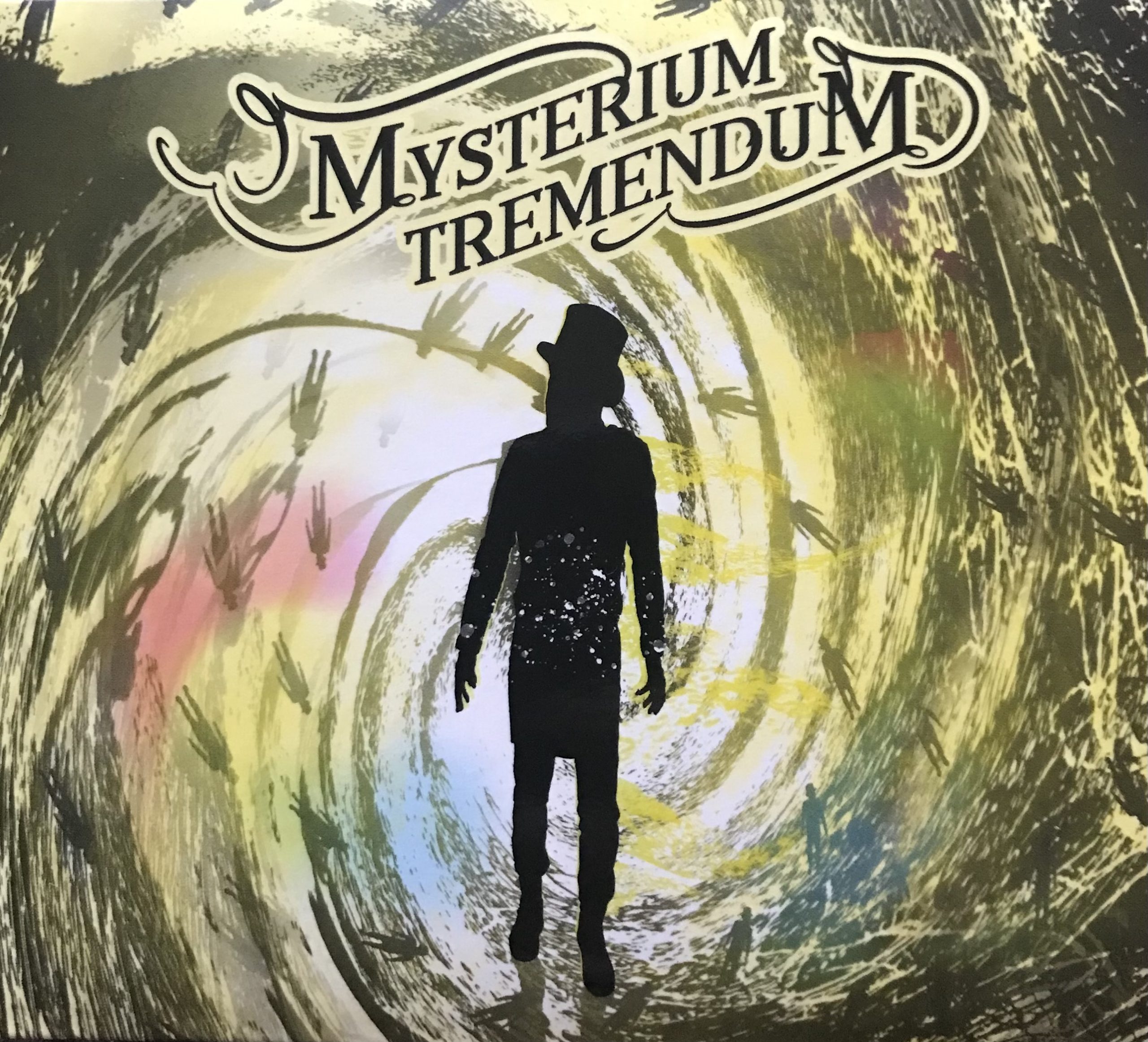
‘Mysterium Tremendum’ was recorded under COVID conditions. What was that like and how did that period impact on the album itself?
Very tough, very trying, very complex in a word. It was like many things at that time. Hard to do, but imperative that you do it. I attempted to keep finding the positive, though there was many a day when it felt like you had to keep reinforcing the idea that something positive might surface from such constrictive and difficult circumstances. There was also the notion that the joy of creating might be halted, due to the aforementioned. As I wrote the album, I realised that it was becoming an almost reverential nod to many styles and juxtapositions that felt like a distinct calling; eclectic elements that still felt like a homogeneous tapestry. Big choruses and progressive sounding ambience infused 8-minute songs, arriving like an imaginary pairing of Morricone jamming with Arthur Lee’s Love on “Getaway Drivers” then alongside the pure synth driven dark disco of “Clarabelle” and the nod to “Grantchester Meadows” by Pink Floyd in the natural sounds of rivers and bees in the pastoral “How Big The Small Can Be”.
Before we get onto the new album, it is important to discuss the accident and the impact that had on your family and your musical outlook as there has been quite a shift between the last album and this one. Please explain what happened and how that has changed your view on what it is you want to achieve.
I sense that the main core of my life had changed in so many ways over the years. It was never in me to attain the societal ideal about what was termed as music achievement. I failed to adopt the drive for any kind of commercial success, but more of being at one with the mystical nature/enchantment and the magic of making music for the sheer reward of making music. As those things became ever more profound, it was as if I was disappearing. I had a mind altering/life altering experience back in 2019. It’s another complex chapter entirely, but maybe a mixture of silent meditation and my dedication to the spiritual path over so many years that suddenly ignited into something else that was both liberating and terrifying. As if all notions about life felt defunct and you become unrecognisable to yourself. Those dualities were ever present until January 2019 when I seemed to morph into this constant blissful state which lasted around 13 weeks: it sounds like a psychedelic trip to anyone who has knowledge of such experiences. Though no social/recreational drugs were ever adopted on any part of my adherence to this path.
In light of this change, the horrific nature of the accident in May ‘22 – when hit by a stolen car in a multiple police car chase at high speed manifested itself, yet only seemed to further solidly this sense of transparency and a gloriously fulfilling emptiness. Yet also the much darker qualities of nihilistic states and remote disassociation were rampant and as visceral as the former more desired states.
It is as if I had been concretised into this unrecognisable shape. Still pondering the great questions and often wondering if anything I was doing was relevant in much of the ‘beige’ media world I confess to shyly and introvertedly inhabit; and of which seemed primarily fuelled by numbers, status, hierarchical models and searing popularity. Post crash there have been symptoms of existential woe, stark, cutting depression and deep trauma related injury, both physical and psychological. My wife, son and I all shared a telling notion: we often expressed a state of being recognised as if large parts of us had died.
Something fundamental had shifted in each one of us.
Asking what was life asking of me? Was I carrying out the tasks I was supposed to, destined to, designed to? I often thought my job in navigating the world of music and its curators and accepted gatekeepers felt like a paradoxical symbiosis of oil and water: an imbalance, a crooked, gnarly, atrophied sojourn…the rites of passage that seemed not to align with my offerings. The creation of music has always felt deeply sacred, something indescribable, ethereal, wildly intangible and mystical. The business was something else altogether. What was I doing? Why was this so difficult?
These all become like a flurry of temporary solutions to permanent problems … our fleeting foray into some newfangled conclusion. As long as you’re alive, I reminded myself, then contradictions continue to reign.
Aside from the real issues of injuries, the crash left us devoid of the tenacious nature and energy required to survive in retaining an income and continuing to make a living as an independent artist. There is the ongoing act of surrender, of giving in and not giving up and trying to just let be when it feels too hard to fully let go.
Things have changed beyond all and any remaining ideas I ever held… about my life, about my music and about the correlation between the bridges of these ephemeral and business relationships I often struggle to balance or make sense of.
The only notion that remains unaltered is in my music itself. It was always about service, always about reaching those I believed it needed to reach. For those who felt as I did. I was a voice in the wilderness of their own exile; what I did, for those confused and conflicted by the turbulent madness of the rigid, prescribed ways of living that we all must juggle. Our authentic selves in a battle with the programmed selves that might lead to those ill-defined yet normalised expectations, awash in nepotism and vaulted career trajectory.
I confess that I might just be a free spirit who has become scarily freer with each life altering incident, true creativity has no limits, and when you have no limits, you are free. This is a declaration, from one who knows not how to maintain a pseudo posture or exchange favourable language that ‘might feather my cap’ … what it is, is what it isn’t, I guess. Self-acceptance is not waiting for a perfect version of myself to emerge but accepting the flawed reality of my own idiosyncrasies and human blind spots.
I’m not here in the way that I once was…. that is both blessed and cursed possibly, but it’s my journey and only I can take it.

‘Beautiful Ugly’ is the new album, what made you decide to work this time with just Damian and Wendy?
It was the whole encapsulation of the pervading moods that seemed to ask that it be completely honoured – it was in that total surrender that I felt compelled to allow what the muse was asking of me. To be kindly dictated to, to not try and figure out what was happening and to persuade any left-brain biases to just let go of any dry, pragmatic ideas or premature conclusions I may have had. Though I’ve always created from the opposite position in general; where I feel the imaginative process is governed by something far beyond my own ideas and limited human knowledge. This was a time when any persona characteristics were outweighed in every notion.
To dare be engulfed by spirit without logic and to willingly drown in exactly what should be realised in these painful moments; and thus, in the aftermath of both raw physical/emotional wounds, in the wake of the horrors of the car accident, I felt as if I was in the healing arms of a maternal energy. It implied that this now unfold like a moving meditation, a contemplative sonic journey; as if the universe was whispering in my ears, where the presence of the sacred was in the subconscious utterings emanating from my bruised and battered gut.
These were such visceral yet delicate expressions. I knew from the first song ‘Success In Failure’ that called to me in the wake of real discomfort, grabbing at my bouzouki to try translate the melody and words that were forming in my head; albeit with such weary tenderness and a burning sensitivity in my body’s pain responses, knowing that this was going to be a most intimate affair of the heart. I imagined the wonder of the modular synth patterns that Damian might provide with touches and featherlike caresses courtesy of Wendy on the violin, no bombastic sing along choruses or the pleasingly terpsichorean additions of earlier releases. in unison.
This album, I hoped, would aim to excel in reflecting my own stripped back, skeletal and hauntingly empty, scooped out disposition, possessed by those untethered subtleties and spaces that are often not seen or heard in anything like the same fashion. The shadows and musings of the psyche that I felt were becoming ever louder, raising the amplification in my finite body amidst its relative imprisonment. It was almost reflecting this singularity of my struggles, yet I was equally awash in the expansiveness that was nonetheless nourishing and incalculably beautiful, hence how the album’s title of ‘Beautiful Ugly’ happened.
Both aspects of my nature were being equally and evidently felt, each counteracting the telling argument or ethos that it proposed. I would endeavour to create something that felt like musical poetry. The impacted, restricted human essence at the core of it, yet being in this florid landscape of wide-open possibilities. Art is taking a step and never knowing where you are heading. Maybe that’s why it is so arresting?
What was the recording process like?
Very strange, unusual but life affirming.
Each song was created amid my greatest physical and mental struggles. The oddest thing was that I felt no ‘mojo’, no inspiration prior to a fully formed song arriving, it was alien: I felt bereft and in so much pain, my trauma often arriving in the shape of emotional despondency, brain fog, hopelessness and more than a nihilistic tendency or two. I was a fully wounded animal, looking at my kin, they as deeply wounded as I, having to face their own painful reflections too. As if another long chapter of ‘lockdown’ was upon us. I wondered if there was any wisdom in maintaining this soupçon of light, this atrophied drive? In exploring my futility and concluding that I would work through the sheer heaviness of this muddy sadness, this blanket of darkness and try to still see the beauty in it…harder to do than you might suggest? It was a constant to and fro with myself. What am I doing, why am I doing it, is it over, is it done for me? At least on a temporary basis.
But what those songs revealed were astonishing sound bites of profound help.
They kept the creative part of me alive; they may have indeed saved me on some level. All my vocals on the album are the original guide tracks. I thought, as I struggled to replicate my previous vocal range and spinning off into my distinctive tremolo/falsetto style, that I would return to this once my rib cage and chest injuries healed considerably, I would re attempt the voice. Though as I listened back it became clear that there was a quality and a range of inflections that would be impossible to replicate; at least on a true scale of what I was going through at that exact moment and time. That’s why I stuck with them. They ‘house’ a distinct texture in their expression that is rooted in these unexplainable, mystical episodes of my rehabilitation. It’s such a precious thing to hear myself teetering on the tightrope of such enormous disaster and fleeting bliss concurrently, beautiful ugly indeed.
I have said this is a very different release to your other albums, how would you describe it and what are you attempting to achieve with its release?
Much like everything I’ve stated above, some may see my responses as ‘hocus pocus’ or infused by some fantastical unadulterated infantile posturing. I wear my own experiences as transparently as I do, I make no apologies for that, and I don’t really need others to believe in what I say or what I am trying to convey. All I will say is that in a world mostly devoid of the higher powers or cosmic wonders of life, I render myself completely to its purpose. I know without knowing how I know in that I know nothing; I am humbled and accept my position as a beginner… it came together in a way that was completely unexpected. I attest to its purity and intuitive nature in how it somehow was created without my being too conscious of how? All the how’s, why’s and the what if’s seem defunct to me. It’s a record that was made by my heart for my heart, when I had never felt the need greater. I was completely there without knowing that I was. Go figure. It remains a mystery, but an auspicious one all the same.
I wanted to execute something that seemed to wrap me unconditionally in her arms; the synths parts radiate with such a depth of warmth and fuzzy richness and are designed in breathtaking detail; they are beyond sublime in their craft and provide the bedrock upon which the contemplatively shy, introverted, somewhat broken and battered voice sit in the middle of those shores. Coupled with the gorgeous melancholy of the violin’s sole sonorous voice it seems to beg and summon the minor key tones of my battle-hardened human construct maybe? It feels like a sonic marriage of fragility, devout trustworthiness, searing sour encounters and bliss all equidistant, alive in a duvet of bittersweet suffocation.
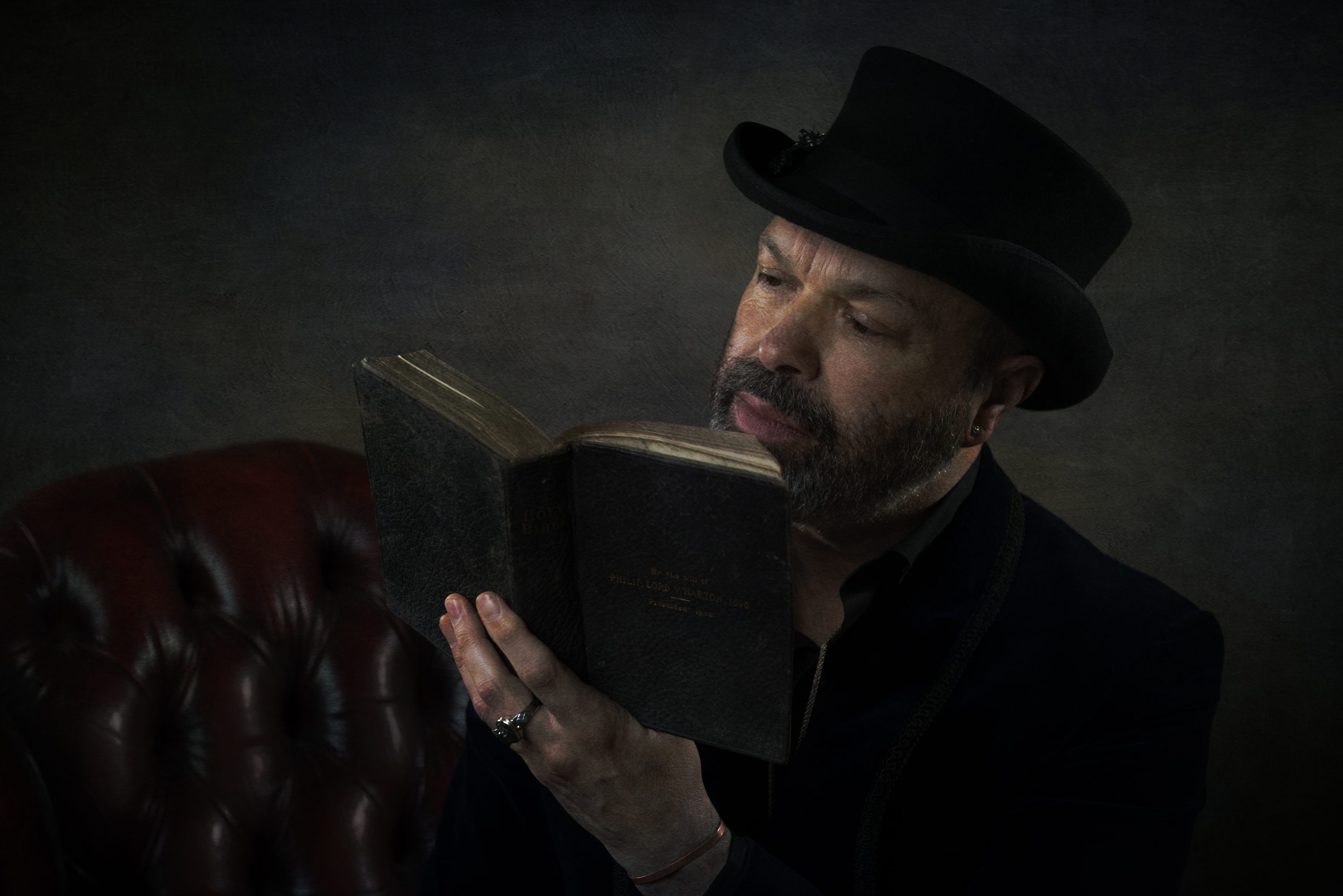
What is next for the Captain?
I’ve given up any notions I have about planning. I think I’ll just keep letting go of notions that neither serve me or the collective and take all the lessons that I can manage hopefully.
To keep letting go or at least letting be when letting go is a struggle. I’m trusting in the higher source at all times possible, following the nose of my heart and realising that wisdom cannot be learned, only revealed. Reminding oneself that it’s all such a short time we get to spend here on this planet. Far too short to get lost in other peoples need for ongoing drama and division. I want to keep making the best music that I can, to grow as much as I can as a being, and to acknowledge my place here. If I retain reverence for the sacred gift of music itself, I trust that my path, as an outsider, will bring me into circles where more free minded curators might just include that Captain bloke on their bill.
To end, what one piece of music would you take with you into solitary confinement of say, a desert island or a dystopian wasteland, if you were allowed just one?
“Barbers Adagio For Strings” It never fails to amaze and dumbfound me on each listen. If ever the themes of life were summarised in perfect measure, it is in this piece that I hear the entire cosmos and it’s play whenever it is aired in the vicinity of my person. Choral music floors me and the choral versions of the aforementioned are beyond description.
For more details about the Captain, where he is playing and how to discover his music, please use the following links.
Website: https://captainofthelostwaves.com/
YouTube: https://www.youtube.com/captainofthelostwaves
Bandcamp: https://captainofthelostwaves.bandcamp.com/
Spotify: https://open.spotify.com/artist/1QdYZe0cCFTrAFkCbyxO4S?
Instagram: https://www.instagram.com/captainofthelostwaves/
Facebook: https://www.facebook.com/captainofthelostwaves

